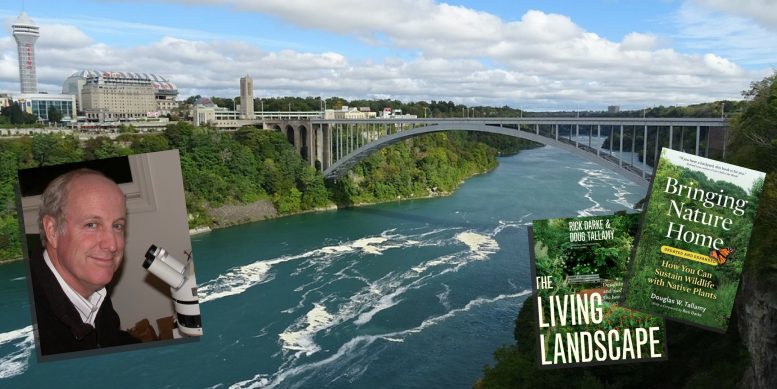The Western New York Land Conservancy is bringing award-winning author Doug Tallamy to Western New York. Dr. Tallamy will give a talk about the critical importance of native plants for the ecology and vibrancy of our region. “A Case for Native Plants” will be held at 7 p.m. on Friday, March 16 at the Niagara Power Vista.
Tallamy’s research and his book Bringing Nature Home have sparked a national conversation about the importance of using native plants in our gardens and landscapes to reverse the loss of wildlife and to make our communities healthier. After decades of intense urban sprawl, our natural places are shrinking and becoming more fragmented. The use of native plants in our yards and gardens will make a difference, no matter the size.
The plight of the monarch butterfly is making headlines all over the nation. To a large degree, their decline is tied to the loss of native plants. Monarch caterpillars are dependent upon a single source of nutrition — native milkweeds. Their populations have suffered dramatic losses as milkweed fields disappear. We can fix this in our own yards by planting many types of native milkweeds, which have gorgeous red, pink, orange and white flowers.
Dave Spiering, Conservation Project Manager for the Western New York Land Conservancy, says Tallamy does a superb job explaining why native plants are so important. “They meet the needs of native insects, which, in turn, serve a complicated food web. Without insects, all terrestrial ecosystems collapse. Native insects require the plants with which they co-evolved.”
“We have eliminated so much nature so fast, that most people don’t realize how little is left.” said Tallamy, “We have devastated our natural areas. If we are going to have functioning ecosystems and biodiversity, we’re going to have to share the land we’ve taken.”
Historically, we have landscaped to add beauty to our yards, without much thought to the role that plants play in maintaining healthy ecosystems. The way we think about our yards needs to shift. Native plants feed our wildlife, clean our water, and support the pollinators that put food on our tables. Like milkweed, many native plants are beautiful too.
Executive Director Nancy Smith said, “The Land Conservancy protects 6,500 acres of remarkable places across Western New York, but we can’t protect everything. If every gardener and landowner, and every business, school, and town park includes even a small number of native plants it will make an enormous difference to our pollinators and wildlife.”
While the event is free, space is limited, so please register before March 15 at www.wnylc.org/events. The presentation begins at 7 p.m. Guests are encouraged to arrive at 6 p.m. for a book signing by Tallamy and to explore all the Power Vista has to offer.
This event is a part of the Land Conservancy’s multi-year Restore the Gorge project, which will maintain and enhance the ecological diversity of the remarkable Niagara Gorge. This project is supported by $1 million from Buffalo Billion Phase II, nearly $1 million from Niagara River Greenway Commission’s Greenway Ecological Standing Committee and a $100,000 grant from Oath Community Benefit Fund for Niagara County by the Empire State Development. Land in the project area is owned by the New York Power Authority and by the New York State Office of Parks, Recreation and Historic Preservation.
The Western New York Land Conservancy is a regional, not-for-profit land trust that permanently protects land with significant conservation value in Western New York for future generations. The Land Conservancy envisions a future in which open spaces, working lands, wildlife habitat and scenic beauty are cherished and protected as part of the landscape and character of Western New York. The Land Conservancy is accredited by the Land Trust Accreditation Commission and is one of 1,500 land trusts nationwide, including 80 in New York State. Land trusts have protected 40 million acres over the last 20 years. For more information on upcoming events, volunteer opportunities, or the mission of the Western New York Land Conservancy, please call (716) 687-1225 or visit www.wnylc.org.




